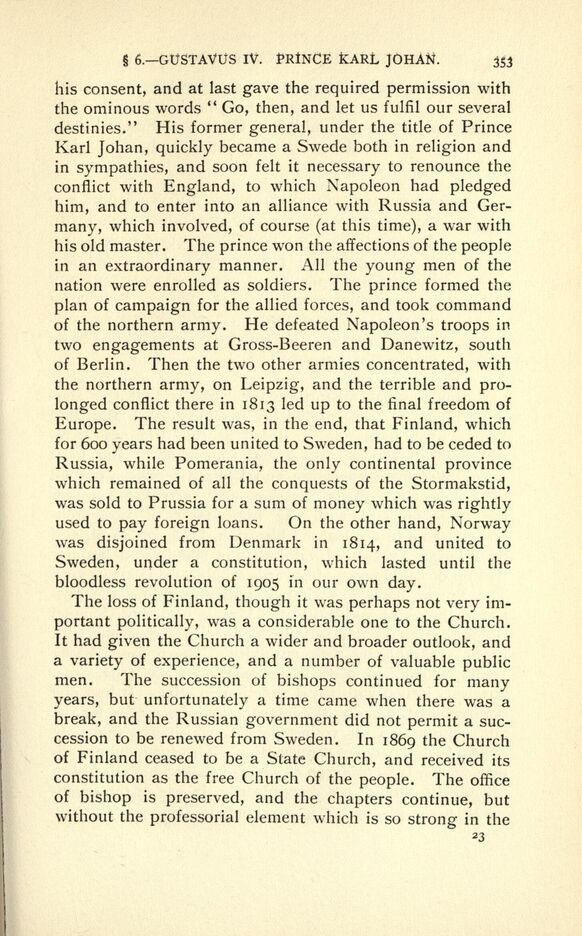
Full resolution (JPEG) - On this page / på denna sida - VII. The Church in the “Time of Freedom” and Period of Neology (1718—1811 A.D.)

<< prev. page << föreg. sida << >> nästa sida >> next page >>
Below is the raw OCR text
from the above scanned image.
Do you see an error? Proofread the page now!
Här nedan syns maskintolkade texten från faksimilbilden ovan.
Ser du något fel? Korrekturläs sidan nu!
This page has never been proofread. / Denna sida har aldrig korrekturlästs.
6. GUSTAVUS IV. PRlNCE KARL JOHAN. 353
his consent, and at last gave the required permission with
the ominous words
"
Go, then, and let us fulfil our several
destinies." His former general, under the title of Prince
Karl Johan, quickly became a Swede both in religion and
in sympathies, and soon felt it
necessary to renounce the
conflict with England, to which Napoleon had pledged
him, and to enter into an alliance with Russia and Ger
many, which involved, of course (at this time), a war with
his old master. The prince won the affections of the people
in an extraordinary manner. All the young men of the
nation were enrolled as soldiers. The prince formed the
plan of campaign for the allied forces, and took command
of the northern army. He defeated Napoleon s troops in
two engagements at Gross-Beeren and Danewitz, south
of Berlin. Then the two other armies concentrated, with
the northern army, on Leipzig, and the terrible and pro
longed conflict there in 1813 led up to the final freedom of
Europe. The result was, in the end, that Finland, which
for 600 years had been united to Sweden, had to be ceded to
Russia, while Pomerania, the only continental province
which remained of all the conquests of the Stormakstid,
was sold to Prussia for a sum of money which was rightly
used to pay foreign loans. On the other hand, Norway
was disjoined from Denmark in 1814, and united to
Sweden, under a constitution, which lasted until the
bloodless revolution of 1905 in our own day.
The loss of Finland, though it was perhaps not very im
portant politically, was a considerable one to the Church.
It had given the Church a wider and broader outlook, and
a variety of experience, and a number of valuable public
men. The succession of bishops continued for many
years, but unfortunately a time came when there was a
break, and the Russian government did not permit a suc
cession to be renewed from Sweden. In 1869 the Church
of Finland ceased to be a State Church, and received its
constitution as the free Church of the people. The office
of bishop is preserved, and the chapters continue, but
without the professorial element which is so strong in the
23
<< prev. page << föreg. sida << >> nästa sida >> next page >>